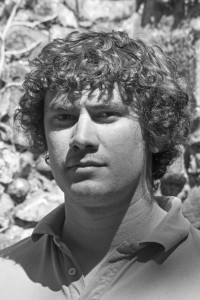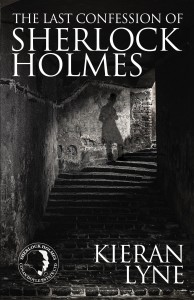 The Writers Who Read interview series welcomes Kieran Lyne this week.
The Writers Who Read interview series welcomes Kieran Lyne this week.
Who are you?
I am Kieran Lyne, author of The Last Confession of Sherlock Holmes and the youngest writer to be endorsed by the Arthur Conan Doyle Estate. I live in the middle of nowhere in Suffolk, England, where I work for a local charity for adults with physical and sensory disability called Mid-Suffolk Axis, as well as at a local pub.
I spend my time reading and writing, watching films and F1, and recovering from various self-inflicted injuries. In what has become a running joke, I will one day also one day continue rebuilding my Series 1 Land Rover.
Which book or series was your gateway into the world of reading?
Tricky one as my reading history is a bit sporadic! When I was young I read mainly James Herbert, Roald Dahl, and Anthony Horowitz: and in my teens I was swept away by the Harry Potter craze. At around the age of 15 I stopped reading fiction and mainly read autobiographies of musicians and political activists, before the discovery of Sherlock Holmes reignited my passion for fiction.
If I can cheat and have several gateways I would opt for: (pre-teens) The Fantastic Mr Fox and The Fog, (early teens) The Prisoner of Azkaban, (mid-teens) The Autobiography of Malcolm X, and (late-teens) The Adventures of Sherlock Holmes.
Nowadays, what makes you crack open a book instead of pressing play on your favorite Netflix show?
Living in the middle of nowhere certainly helps! But personally I get a different kind of enjoyment from reading than I do from watching films or TV. When you read something special you can delight in the author’s turn of phrase, the beautiful descriptions, or the subtle observations. It is almost impossible to satisfactorily translate the magic of prose.
I would point to two of my favourite books The Great Gatsby and A Clockwork Orange: both have plots that are easily transferable, and yet their adaptations don’t quite suffice. There is always something missing, and I think it’s that extra delight that only truly special prose can inspire.
Which authors are auto-buys for you? Why?
This might sound odd but I’m not sure I have any. Sebastian Faulks is one of my favourite contemporary writers, but if the subject matter really wasn’t my cup of tea, I wouldn’t buy one of his books just for the sake of it.
If I’m unsure what to read I will usually spend ages staring at my book shelf, reading bits and bobs of certain titles before concluding that I’m still not in the mood for that particular tale: for some reason I have done this several times with Charlotte Grey despite Faulks being the closest person I have to a “go-to” author.
This is probably because my current reading habit is to chop and change between different styles and genres. For example over the last few months I have read The Magician by Somerset Maugham, We by Yevgeny Zamyatin, The Prophet by Kahil Gilbran, and Alice’s Adventures in Wonderland by Lewis Carol.
What is your book kryptonite–those unique settings, tropes, or character types that make you unable to resist reading?
I don’t really have any one specific kryptonite to be honest! My main criteria are a book has to be well written, and the characters have to be engaging.
As I mentioned earlier I recently read We, which is the novel George Orwell credited as his inspiration for 1984. I thought We was absolutely fantastic: it’s brilliantly written and most importantly I felt a genuine connection to the characters. Whereas I thought 1984, which is extremely similar in content, was incredibly dull. I didn’t enjoy the prose, and I really didn’t care what happened to the main character, so much so I can’t even remember his name.
This is an example of why I don’t really have a kryptonite per se, but my favourite time period extends roughly from around the 1880s to the late 1930s. The immense social upheaval which takes place throughout this period, as well as the vast contrasts in settings, means it was and is a thick vein for literature: whether it is the atmosphere of gothic tales such as The Picture of Dorian Grey, the splendour of Brideshead Revisited, or the tragedy of Birdsong, my kryptonite is to be found lurking somewhere in this 50-year period.
I still maintain however, that I would much prefer to read something of quality set in an unfamiliar period, than read 50 Shades of Dorian Grey.
What is your ideal time and place to read?
I don’t enjoy reading with lots going on in the background and prefer to be the only person in the room. I don’t know why, but I really don’t like being in the same room with other people reading. So long as I have my solitude I’m not too fussy: I can read at anytime of the day, so long as I’m not too tired, but usually it will be in the afternoon or early evening.
Are you a re-reader? Why or why not?
I am, but only if the book is truly special: I have re-read Gatsby because of its stunning prose, The Autobiography of Malcolm X because of its raw power, A Clockwork Orange because of its sheer uniqueness, and several Sherlock Holmes stories because of the relationship between Holmes and Watson.
You don’t always want to read something profound, and plot-driven thrillers are of course extremely popular, but if there is little else to be gained from a book other than the thrill of the plot then I would not usually bother reading again. I find this with authors such as Robert Goddard, who spins an excellent yarn, but does not fill me with any desire to return to the same story again and again.
Which books have had the biggest influence on your writing? 
The Adventures of Sherlock Holmes remains my favourite Holmes book, and it had a huge influence on my decision to write a Holmes novel. I loved the interaction between Holmes and Watson, and also the subtlety of the plots: which I believe is best encapsulated by the stories which include no crime at all.
Recently I was greatly impressed by The Good Man Jesus and the Scoundrel Christ by Philip Pullman. I loved the simplicity of his prose, but also the feeling that virtually every word was chosen correctly, and that he was in complete control. He is simply telling a story, nothing more, nothing less: and I think it is a core lesson that is often too easily forgotten.
I have also found that non-fiction books can have an impact on the way I consider writing fiction. Actors are almost entirely focused upon character, which is also the most important ingredient for authors, so I found Al Pacino: The Authorised Biography particularly insightful and is also one of the few books I will read again and again.
In terms of books which have aided me in the craft, I found On Writing by Stephen King, and Write Away by Elizabeth George, both to be very helpful, and compliment each other nicely.
What makes a book a satisfying read for you?
“There are many perfect short stories, but no perfect novels.” When I first read this quote by Ballard I remember being quite surprised, but when I started to think about it I couldn’t help but agree.
The majority of my favourite books happen to be fairly short: but even Gatsby isn’t perfect. I do like long novels, but in terms of satisfaction, I seem to prefer my books short and sweet. Similar to a short story, I like a novel to be a snapshot: filled with atmosphere, character, and great prose.
Though no matter how long or short, I find that the most satisfying books are the ones that alter your perception somehow: whether it is something as profound as your attitude toward life, or as trivial as where you want to go on holiday, the most satisfying books carry a weight beyond their words.
What are you reading right now?
At the moment I’m reading Cosa Nostra by John Dicke, A Sicilian Romance by Ann Radcliffe and Brave New World by Aldous Huxley.
~
You can find out more about Kieran on his website or Twitter (@Kieran Lyne). You can also check out The Last Confession of Sherlock Holmes here.
